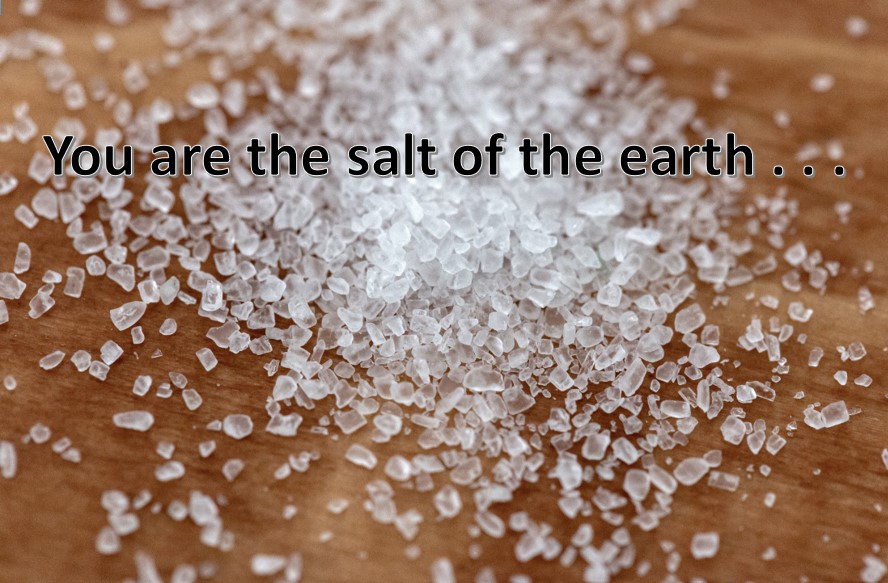“Your light must shine before others . . .”
Last Sunday we heard the beautiful Beatitudes – the speech that Jesus gave on the mount. Today we hear that Christians are not only to be “virtuous” as we heard a week ago; they are to be “the salt of the earth”, “the light of the world”, “a city set on the mountain”, and “the lamp on the lampstand”. This series of metaphors enables us to understand better our Christian life and our role as disciples of Christ. The image of salt and of light is especially powerful and moving.
In saying that the disciples are the “salt of the earth,” Christ is describing the critical character of the Christian vocation. Let’s state it directly: either the Christian heightens the quality of human life and makes it more palatable, more delightfully nourishing, or he has no reason for being. Salt is not for its own sake. Insipid, tasteless salt is an image of those Christians who lost their proper flavor, have forgotten their function as condiment of society. Mimicking the world’s standards instead of influencing the world by our Gospel way of living is exactly this insipid salt which Jesus is talking about – the salt that “loses its taste” and “is no longer good for anything.”
The temptation to follow the trends and behaviors of the society which people are living in has always been a real challenge for Christians, especially in secular societies, as in modern America. The pressure for homogenization of behavior, language and values, and continuous calls for inclusivity can deceive even dedicated Christians. This pressure could undermine their determination to be faithful to the Gospel message and, instead, conform to the world. We Christians are different, and we have to be different. These are strong words but absolutely true. Of course, this truth by no means can be a base for placing ourselves above other people. But if we objectively look at the Gospel standards which we are called to live, we would have to admit that these Christian standards clearly differentiate us from the world’s way of living.In his letter to the Romans, St. Paul powerfully makes the same point in his exhortation to Christians: “Do not conform yourselves to this age.” (Rom 12:2)

Christians very frequently are accused of either being outdated or intolerant, or both, and are called to reform. In regard to Catholic teaching, do we really have to reform or is it that the world needs to reform? The answer is very simple: there is absolutely no need – or better, no possibility – to change Gospel standards since they are eternal and not changeable. Why is that? Because Gospel standards are not a product of societal agreement, this or another person’s invention, nor a product of God’s caprice or his arbitrary decision. They are eternal because they perfectly correspond to human nature; fulfilling them enables us to become who we really are. Gospel standards are similar to the truths in mathematics such as a simple equation: 2+2=4. There is no need to modernize the result of this equation; even more, it is not possible. This equation was valid thousands of years ago, was valid during Jesus’ life, is valid today, and will be valid to the end of the world and for all eternity. Exactly the same applies to Gospel standards.
Our recognition of the fact that the Gospel way of living differs – and has to differ -from the world’s standards is proportional to the degree of our own maturity in the faith. When we begin an authentic Christian life, we notice very quickly how this new life diverges from our previous one and from that of others. Our valuation of things is different, our choices are different, and also our joys are grounded in something else.

Let’s look at the description of the Christian life recorded in the Letter to Diognetus, a document written in the end of the second century after Christ: “Christians are indistinguishable from other men either by nationality, language or customs. They do not inhabit separate cities of their own, or speak a strange dialect, or follow some outlandish way of life. Their teaching is not based upon reveries inspired by the curiosity of men. Unlike some other people, they champion no purely human doctrine. With regard to dress, food and manner of life in general, they follow the customs of whatever city they happen to be living in, whether it is Greek or foreign.”
“And yet there is something extraordinary about their lives. They live in their own countries as though they were only passing through. They play their full role as citizens, but labor under all the disabilities of aliens. Any country can be their homeland, but for them their homeland, wherever it may be, is a foreign country. Like others, they marry and have children, but they do not expose [kill] them. They share their meals, but not their wives . . . To speak in general terms, we may say that the Christian is to the world what the soul is to the body.”
These ancient Christians teach us that by no means should we be ashamed or embarrassed because of our Christian way of living; on the contrary, we should be proud of it and continuously thank God that he gave us the grace of faith.
In the conclusion of today’s Gospel, Jesus said: “Your light must shine before others, that they may see your good deeds and glorify your heavenly Father.” Jesus tells us then that our personal faith by its very nature is not for ourselves alone: it is always oriented towards others; it is a mission. The good works of Christians are the beams of light that manifest the goodness of their Father to all. The Father cannot be seen, for he dwells in heaven; therefore, the visible presence and behavior of Christians represent the presence of God.
The whole purpose of Christians letting their light shine before men is “that they may see” the light of their good works “and glorify your Father.” Seeing leads to glorifying. The light that flows from a Christian presence should manifest God’s joyous glory and induce man to return that glory in praise. Since baptism, confirmation, and the Eucharist have impressed the form of Christ upon their lives, Christians, in real sense, are the visibility of God’s glory.
Although God’s splendor and beauty are manifested everywhere in his creatures; but these are like reflections of the divine qualities of wisdom, harmony, and beauty. Christians – human beings who have put on the form of Christ – manifest the personal glory of God, His mystery as lover of mankind, faithful friend, ardent companion, selfless redeemer. The deepest vocation of Christians is the continual glorification of God, both by themselves and, through themselves, by all others. Christians ought to become the locus, the cause, and the vehicle of God’s glorification in the world. The presence of those Christians who are salt and light to others demonstrates that God’s dwelling, which is properly in heaven, has become embodied in a humble human house – that is made from the clay of the earth, but filled with God’s breath.
Fr. Mark Jurzyk
